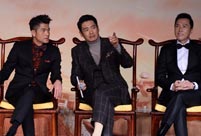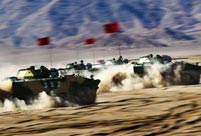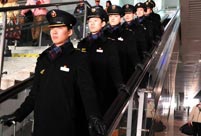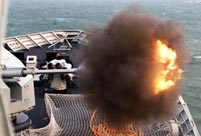 Cockfighting show staged in E. China's Heze during Spring Festival
Cockfighting show staged in E. China's Heze during Spring Festival
 Chinese New Year Flower Fair opens in San Francisco
Chinese New Year Flower Fair opens in San Francisco
 Festivities in Shanghai
Festivities in Shanghai
 PLA navy conducts drill in North China Sea
PLA navy conducts drill in North China Sea
 World's high-tech hotels
World's high-tech hotels
 Li Na poses with trophy on Brighton Beach in Melbourne
Li Na poses with trophy on Brighton Beach in Melbourne
 Six Chinese divers back safely after 300-meter saturation dive
Six Chinese divers back safely after 300-meter saturation dive
 Traditional wedding ceremony of Yao people
Traditional wedding ceremony of Yao people
 Taipei Game Show attracts geeky gamers
Taipei Game Show attracts geeky gamers
SUVA, Feb. 7 -- Chinese ambassador to Fiji Huang Yong on Friday published a commentary in the Fiji Times and several other local media, criticizing Japanese Prime Minister Shinzo Abe' s visit to the World War II criminal-honoring Yasukuni Shrine and refuting the Japanese ambassador's argument to defend and justify Abe's visit.
Eiichi Oshima, Japan's ambassador to Fiji, wrote an article entitled "Need for dialogue between leaders" in the Fiji Times on Jan. 31 -- the first day of Lunar New Year when Chinese across the globe were celebrating the Spring Festival -- to justify Abe's Yasukuni Shrine visit, questioning China's defense expenditure growth in recent years.
In response, Chinese ambassador Huang Yong published his commentary. The article said the history of Japan in the past century was "a brutal history of aggression and colonialism".
"Japan annexed the Korean peninsula in 1910, occupied China's Northeast in 1931, and launched the total war of aggression against China in 1937, it then started the Pacific War in 1941. These wars caused huge casualties and property losses to the victimized countries. Japan's war of aggression against China caused more than 35 million military and civilian casualties, with economic losses amounted to more than 600 billion U.S. dollars," Huang said in the article.
"Moreover, Japan forcibly recruited a huge number of 'comfort women' and committed ruthless atrocities such as 'Nanjing Massacre ' and 'Manila Massacre' during the wars."
Given all these historical facts, the article said, the Japanese government's recognition of and attitude towards the past wars directly affect the feelings of the people of the victimized countries.
"Only when Japan faces up to history, can it open up the future. It is the expectation of the victimized countries that Japan should admit its guilt and repent sincerely," the article said.
"However, the attitude of Abe's government towards history not only contrasts sharply to that of Germany, but also runs counter to the will of the Asian people...Distorting and beautifying Japan 's history of aggression, Abe's tribute to the war criminals, whose hands were stained with the blood of the victimized people, posed not only disrespect and blasphemy to the war victims, but has also inflicted new great harm on the people of the victimised countries."
"It is obvious to see from the series of related actions that the essence behind Abe's homage is his attempt to shake off Japan' s historical burden, and to create conditions for revising the Peace Constitution and expanding its armaments," the article said.
"Abe persisted in overturning Japan's history of aggression on the one hand, while emptily talked about 'pledge for everlasting peace' on the other hand. How can he convince the international community with his so-called 'commitment to peace'," inquires the article.
Responding to the Japanese ambassador's "dialogue" appeal, Huang said "It is Abe himself who has shut the door to China-Japan high-level dialogue."
"Before Abe's homage to the Yasukuni Shrine, there was no obstacle in the contacts between the Chinese and the Japanese leaders," the article said.
"In fact, it was Abe's blatant homage that openly went against the principles and spirit of the four political documents between China and Japan, seriously undermined the political foundation of Sino-Japanese relations and poisoned the atmosphere of Sino- Japanese relations," it said.
On the defense expenditure issue, the article pointed out that "Japan's per capita military spending is five times of that of China."
"The Chinese people love peace, and China is committed to peaceful rise...China is a huge country with 1.3 billion people, 22,000 km land border lines and 32,000 km coastline, therefore China's defense task is a heavy one," said the article.
"Abe's double face cannot deceive the world," it said.
On Jan. 16, Huang published another commentary article on the Fijisun newspaper and several other local media, criticizing Abe's visit to the Yasukuni Shrine and his plan to visit the former battlefields in several South Pacific island countries to pay respect to the "souls" of the Japanese soldiers who died in the Pacific War.
 3D film 'The Monkey King' premieres in Beijing
3D film 'The Monkey King' premieres in Beijing  Miss Chinese Int'l Pageant 2014 held in Hong Kong
Miss Chinese Int'l Pageant 2014 held in Hong Kong 'Golden Flowers' in the Spring Festival travel rush
'Golden Flowers' in the Spring Festival travel rush Li Na beats Cibulkova to win Australian Open
Li Na beats Cibulkova to win Australian Open Sexy models at Taipei Game Show 2014
Sexy models at Taipei Game Show 2014 'Living in ice house' competition held in central China
'Living in ice house' competition held in central China  Highlights of Chinese airborne troops'exercises
Highlights of Chinese airborne troops'exercises  All-male high speed train crew during Spring Festival travel rush
All-male high speed train crew during Spring Festival travel rush PLA navy drills in East China Sea
PLA navy drills in East China Sea President Xi visits border troops ahead of Lunar New Year
President Xi visits border troops ahead of Lunar New Year What do Chinese pack in their luggage in Spring Festival Rush?
What do Chinese pack in their luggage in Spring Festival Rush? Blind date fair in Hangzhou of Zhejiang province
Blind date fair in Hangzhou of Zhejiang province Film 'Where Are We Going, Dad' premiered in Beijing
Film 'Where Are We Going, Dad' premiered in Beijing  Australian Open champion Li Na returns to hometown Wuhan
Australian Open champion Li Na returns to hometown Wuhan Twin sisters serve during Spring Festival travel rush for the first time
Twin sisters serve during Spring Festival travel rush for the first timeDay|Week|Month